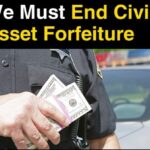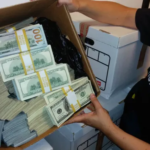The FBI Is Trying to Keep More Cash Seized from a Beverly Hills Vault
It’s been months since the feds confiscated money and other valuables from safe deposit boxes in a Beverly Hills strip mall, but they’ve yet to produce evidence that crimes were committed
IAN SPIEGELMANSEP 20, 2021
Three months after a judge issued a temporary restraining order to halt the FBI’s attempt to keep $86 million in cash, jewelry and precious metals it seized from the U.S. Private Vaults store in Beverly Hills based on scant evidence that the wealth was related to any crimes, the Feds are still fighting to hold onto that loot and more.
About 300 of the 800 people whose cash and valuables the agency is trying to take have contested the seizures, and roughly 65 have filed court claims on Constitutional grounds, but the FBI filed further complaints Friday seeking permission to take cash from more box holders, the Los Angeles Times reports.
The government now wants to keep an additional $154,600 in cash from one box holder and $330,000 from another. In those cases, the only indication of criminal activity is that a drug-sniffing dog alerted on the money—which has its own problems as “evidence”—and the fact that both box holders had unsuccessfully applied for state licenses to sell marijuana. This led two Assistant U.S. Attorneys to suggest that “the funds are drug-related.”
However, at least two vaults in the Olympic Boulevard strip mall were used by licensed marijuana sellers who are prevented from using banks by federal drug laws, and the scent could have spread from their boxes—or from any of the cash in the bank where the government is storing all the seized cash. Plus, as more states legalize marijuana the usefulness of pot-sniffing dogs has decreased and law enforcement agencies have been retiring them in favor of dogs that alert only on cocaine, heroin, and methamphetamines.
In this case, Smithy, an eight-year LAPD veteran, has been trained to sniff out all four narcotics and has detected weed more often than the other three drugs combined.
The government also wants to help itself to $960,100 and $519,000 in cash it took from the boxes of two brothers based on its belief that one of them had “been in contact with” suspected cell phone store armed robbers—which their lawyer calls “an appalling and unconstitutional abuse of power.”
Prosecutors also accused one $900,000 box holder of being “either a top-level drug trafficker or money launderer” based on the way the man bundled his cash in assorted rubber bands, tape-wrapped paper, bank bands and shopping bags.
A lawyer for that customer told the Times, “The notion that the old rubber bands mean they must be drug dealers is ludicrous.”
The Feds were already forced to return the $57,000 life savings of unemployed chef Joseph Ruiz after declaring that there was no way he could have saved up that kind of cash. Ruiz proved that he had.
So far, prosecutors have only described past criminal convictions or pending charges against 11 box holders. Although U.S. Private Vaults was indicted on charges of conspiring with unnamed customers to sell drugs, launder money, and hide transactions from the government in February, no people have been charged and no one has stepped forward to represent the business, even to enter a plea.
Robert E. Johnson, a lawyer representing Ruiz and six other box holders in a class-action suit seeking to destroy all records generated by the government search, tells the Times, “The government’s theory is that having cash makes you a presumptive criminal, and I think every American should be worried about that.”


